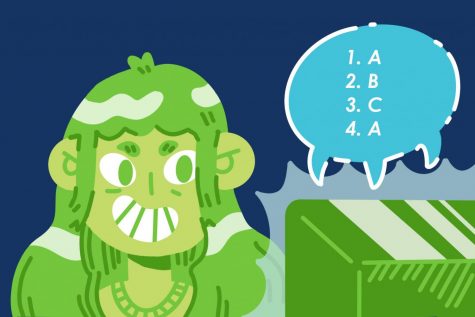OPINION | Hybrid learning evolves cheating methods at Tulane

As Tulane introduced combined in-person and online classes into a hybrid learning model, they inadvertently introduced new opportunities to cheat. Cheating is already common at Tulane, so there should be no doubt among members of Tulane’s administration that students are taking advantage of new ways to skirt the system, both in an online setting and an in-person environment.
When the coronavirus pandemic escalated last spring, higher educational institutions moved towards online instruction. Preceding spring exams and finals, these institutions questioned how to conduct assessments, given that there was no concrete way to enforce standards of academic integrity with teachers and professors being separated from students.
Online testing uses a number of methods to prevent cheating including monitoring through computer cameras, varying the order of test questions, restricting testing windows, showing one question at a time, implementing a lockdown browser and planning for technical issues that may arise during online test taking.
However, as online testing gets craftier, so do students. Students can create and strategically position extensive cheat-sheets to circumnavigate camera monitoring, collaborate with classmates, or use multiple devices that render lockdown browsers useless. Additionally, when removed from direct contact professors, personal accountability diminishes, and people feel less bound by signing honor codes or academic integrity agreements.
At Tulane, professors do not always impose harsh restrictions when they require students to take tests online. While some employ the use of lockdown browsers, others test through Canvas and just hope that students refrain from cheating.
The evolving nature of the in-person classroom model consequently invents new ways for students to break the Academic Code of Conduct. Classes are held in larger spaces where professors can neither rely on their own close watch of student behavior, nor can they rely on their own students to hold each other accountable. Given students are spaced six feet apart, it is difficult to tell when others are using phones or written guides during a test, and even if it is possible, it is not easy to identify those who cheat when wearing masks.
Hybrid learning has made academia much more intrusive. No longer is learning restricted to the typical hours of the school day or week. Classes can be held anywhere, anytime, and with so much of the learning taking place outside of the classroom, it is likely that professors do not understand how much work students are required to complete.
Not only is cheating easier, but also can seem more necessary to succeed as the use of technology during the COVID-19 era has expanded the amount of schoolwork given to students. Anxiety and depression among graduate students has dramatically increased, and may act as external factors contributing to difficulty in completing schoolwork the traditional way.
Realistically, there is little the Tulane administration can do to mitigate cheating in the age of the coronavirus. Students cheated before, students cheat now and students will continue to cheat afterwards. The only viable solution to decrease cheating is to change the nature of assessments so that common forms of academic dishonesty are not successful or, better yet, provide students with the tools that would decrease the need to commit academic dishonesty. Tests should be open note, collaboration should be allowed, and the format of tests should be changed so that the goal is to understand and apply material rather than memorize.
It is unlikely that the academic environment will return to how it was before the pandemic. Faculty and students alike need to try and adapt so that academic integrity can be maintained as the format of learning continues to change.
Your donation will support the student journalists of Tulane University. Your contribution will allow us to purchase equipment and cover our annual website hosting costs.


